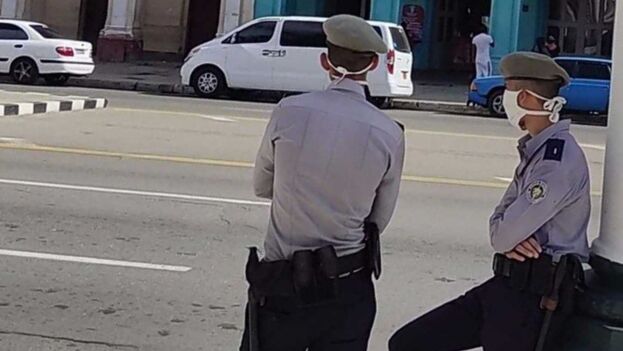
![]() 14ymedio, Yoani Sánchez, Generation Y, Havana, 17 May 2022 — The new Cuban Penal Code, recently approved by the National Assembly and which will enter into force in the coming days, is a detailed compendium of the main fears of the ruling party. Like any authoritarian model, the island’s regime is forced to break down each prohibition and enumerate all the punishments, trying to anticipate even the new forms of confrontation and rejection that may arise from the citizenry.
14ymedio, Yoani Sánchez, Generation Y, Havana, 17 May 2022 — The new Cuban Penal Code, recently approved by the National Assembly and which will enter into force in the coming days, is a detailed compendium of the main fears of the ruling party. Like any authoritarian model, the island’s regime is forced to break down each prohibition and enumerate all the punishments, trying to anticipate even the new forms of confrontation and rejection that may arise from the citizenry.
When reading between the lines of the new regulations, and separating what it inherits from the previous Code in terms of penalizing common crimes, the great panics that keep Cuban leaders awake at night emerge. The independent press, activism, popular protests in the style of the one that occurred on July 11 (11J), and the possibility that individuals unite in initiatives to revoke the economic political system, these are at the center of the tremors that run through the Plaza of the Revolution.
Journalism not controlled by the Communist Party of Cuba (PCC) bears one of the worst parts of this new legislation, which further demonizes the access of the independent press to funds and resources from international organizations and foundations. In a country where a group of men uses the public coffers at will to support their media of ideological propaganda, those same individuals try to cut off any financial oxygen that allows the existence of newspapers or magazines that annoy power. Only the PCC can carry out the exercise of content dissemination, under supervision and with censorship’s scissors ready to cut everything that does not benefit the Party.
However, the current twist already had its antecedents in the Gag Law for which 75 dissidents went to jail in the Black Spring of 2003 and which has never been repealed. So it can be interpreted more as an update to the new realities than the beginning of an unprecedented raid against the free flow of news. The growing popularity of information portals managed by independent journalists has put in check a dictatorship that, for decades, ruled from secrecy and absolute control of information dissemination.
Something similar occurs with article 120.1 of the new Code, which penalizes anyone who “arbitrarily exercises any right or freedom recognized in the Constitution of the Republic and endangers the constitutional order.” As in the Constitution the PCC is considered the superior force and leader of society; trying to change that and erect another alternative will result in a serious, very serious crime. However, a similar straitjacket already existed with the popularly called “constitutional mummification” which, without meeting the requirements of a referendum where voters were asked their position in favor or against the proposal, was imposed in 2002.
In short, if much of what is penalized in this legislation was already prohibited, in one way or another, in decrees, regulations and resolutions, it is worth asking the reasons for reinforcing this veto and expanding the punishments in the new Code. Everything indicates that it is a victory for the forces of immobility; we are facing the image of those bridges, the ones dynamited by the most retrograde to prevent democratic change from coming from within the Island, from springing up from ordinary people. This is, in reality, a glossary of the terrors of Castroism and its desperate attempts to stop what will come no matter what.
The Penal Code designed to bind us all points to the fact that it has been drafted by a system sunk in mistrust of society and in fear of the future.
________________________
Editorial Note: This text was originally published in Deutsche Welle in Spanish.
____________
COLLABORATE WITH OUR WORK: The 14ymedio team is committed to practicing serious journalism that reflects Cuba’s reality in all its depth. Thank you for joining us on this long journey. We invite you to continue supporting us by becoming a member of 14ymedio now. Together we can continue transforming journalism in Cuba.
